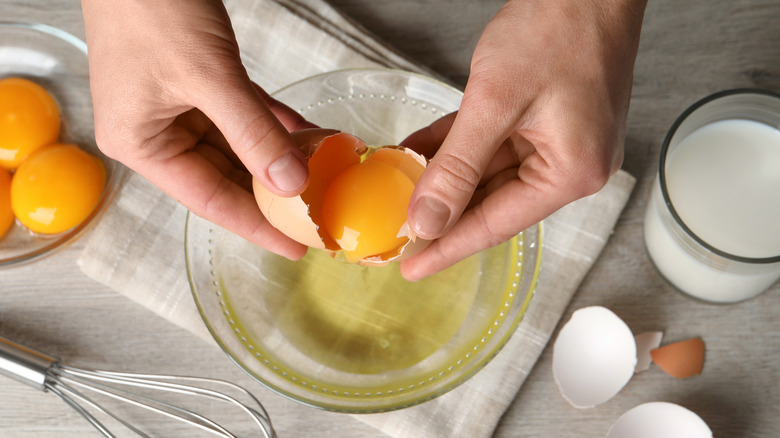Is It Ever Safe To Eat Raw Eggs?
Have you seen "Rocky," the iconic movie that shaped generations? If so, you might remember the scene where Rocky Balboa cracked five raw eggs into a plastic cup and drank them prior to his workout. Fast forward to today, and many people still believe that eating raw eggs is one of the best ways to boost your protein intake. A common argument is that cooking denatures the protein in food and therefore affects its nutritional value, but that's only partly true.
The protein in cooked eggs is more bioavailable than that in raw eggs, notes a 1998 study published in the Journal of Nutrition. So, while it's true that cooking alters protein structure, it also makes it easier to digest and break down. However, it's worth mentioning that cooked eggs are up to 20% lower in vitamin A than their raw counterparts, according to 2014 research presented in the International Journal of Food Sciences and Nutrition. So there are pluses and minuses.
But is it safe to eat raw eggs? The answer depends on who you ask, but most health experts advise against it. As it turns out, about one in every 20,000 eggs is contaminated with Salmonella enterica, a bacterium responsible for foodborne illnesses. That's one of the reasons you should be careful when tasting raw homemade pasta dough, aioli, mayonnaise, and other food products made with uncooked eggs.
Raw eggs are packed with nutrients but may cause food poisoning
The Centers for Disease Control and Prevention (CDC) and other health organizations don't recommend eating raw eggs. Hens and other birds can get salmonella from the environment without showing any signs of illness. The bacteria can be passed on to their eggs, contaminating the yolks, whites, or outer shells. In some cases, eggs become contaminated with salmonella after touching bird droppings.
This microorganism can grow and multiply at lightning speed, increasing the risk of disease. For example, Salmonella enterica can double in number in as little as 20 minutes, according to 2012 evidence published in the Journal of Bacteriology. Unfortunately, there's no way to tell if an egg carries the bacteria just by looking at it. On top of that, over 80% of the infected eggs are contaminated on the inside, so washing them won't remove or kill the germs.
Salmonella infection, or salmonellosis, is more likely to occur in elderly people, children, and individuals with compromised immune systems. Its symptoms may include stomach pain, vomiting, diarrhea, fever, and digestive discomfort and can last anywhere between four and seven days. In rare cases, the bacteria may cause a systemic infection, which can be fatal. The CDC recommends seeing a doctor if you have persistent diarrhea for longer than three days or a fever higher than 102 degrees Fahrenheit. Other severe symptoms, such as prolonged vomiting and blood in the stool, require medical attention, too.
Some eggs are safe to eat raw
Raw eggs contain slightly more vitamin A, calcium, iron, potassium, and antioxidants than their cooked counterparts, but the difference is negligible. Leaving this aspect aside, you may still want to use uncooked eggs in sauces, cocktails, crème fraîche with chocolate mousse, or homemade ice cream. If that's the case, you can either opt for pasteurized eggs or replace them with silken tofu, applesauce, chia seeds, or ground flaxseeds — depending on the recipe.
Pasteurized eggs are briefly heated in their shells before hitting the store shelves, explains the U.S. Department of Agriculture. This processing method kills Salmonella and, therefore, eliminates its health risks. That's why all food manufacturers use pasteurized eggs in hollandaise sauce, ice cream, tiramisu, and ready-made meals. Egg white powder and other dried egg products undergo pasteurization, too, so they're safe to eat raw. For example, it's perfectly fine to mix this versatile egg powder into smoothies or protein shakes.
Apart from that, unpasteurized eggs should be refrigerated in their original carton at 40 degrees Fahrenheit or below and cooked until firm. The optimal cooking temperature for muffins, frittatas, soups, and other dishes made with eggs is 160 degrees Fahrenheit or higher, and you should also reheat the leftovers to 165 degrees Fahrenheit before serving. To stay safe, consume them within three to four days or freeze them for up to three months.


